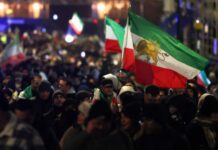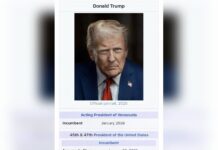HONG KONG: Hong Kong’s pro-democracy camp was cruising towards a crushing victory in community-level elections on Monday, sending the Beijing-backed government a clear message of public support for the demands of a protest movement that has gripped the territory for months.
Counting was still under way following record turnout in Sunday’s polls, but partial results indicated that candidates favouring greater democracy were on course to seize a shock majority of the normally establishment-dominated 18 district councils.
The stunning result was a humiliating rebuke to Beijing and dashed any lingering hopes of Hong Kong leader Carrie Lam that the increasingly aggressive tactics deployed by radical protesters would encourage a silent majority to turn out in support of her administration.
Change-seeking politicians seized on the result as proof that citizens want more say in running the city.
“No matter how strong Carrie Lam is I hope she can comply with the wishes of the people, fulfil the five demands (and) give the youngsters a chance,” political activist Jimmy Sham told reporters after winning a district council seat.
The protest movement has made five key demands, including direct popular elections and a probe into alleged police brutality. Lam has dismissed the idea of government concessions as “wishful thinking”.
Hong Kong has endured months of mass rallies and violent clashes, initially touched off by anger over a bill backed by Lam that would have allowed extraditions to China’s opaque judicial system.
District councils handle community-level concerns such as bus routes and garbage collection and the polls typically generate little excitement. But Sunday’s contest for 452 seats took on new political significance because of the public discontent.
The result was “nothing short of a revolution,” Hong Kong political analyst Willy Lam said. “It’s a sound repudiation of the (Hong Kong) administration and Beijing’s policy toward Hong Kong.” The result could hasten Beijing’s expected removal of Lam as Hong Kong’s leader, he said, but may also extend the city’s crisis.
“Protesters will see this astounding victory as a mandate given by the people, so they will fight harder. But at the same time there won’t be any concessions from Beijing, so the frustration will mount,” Lam told AFP.
China’s state media had urged Hong Kongers to vote against violence, but downplayed the results on Monday. “The record turnout has sent the message that however violent the rioters are, ordinary residents are concerned about their own well-being,” a China Daily editorial said.
With just more than half of the 452 races officially tabulated early Monday, 201 pro-democracy candidates had won their races, against just 28 pro-Beijing establishment candidates and 12 independents.
In the last council vote in 2015, just over 100 democrat-leaning candidates won seats. A record 71 percent of the 4.13 million citizens who registered to vote had cast their ballots, according to Hong Kong’s election watchdog.
Hong Kong’s largest pro-Beijing political party was seriously bloodied, with at least 155 of its 182 candidates defeated, media reports said. Among them were firebrand lawmaker Junius Ho, one of the politicians most loathed by democracy activists, and who was stabbed this month during campaigning.
The vote is the closest Hong Kongers get to direct representation.
The territory’s legislature is elected by a mix of popular vote and industry groups stacked with China loyalists, which ensures Beijing’s control. Some candidates for next year’s legislative elections will be drawn from the district councils, and the bodies also will contribute 117 members to the 1,200-strong Beijing-controlled electoral college that chooses the chief executive.
Protests eased in the poll run-up after pro-democracy figures urged calm to avoid triggering any election delay or suspension. Campaigning was marred by acrimony, with one pro-democracy candidate having his ear bitten off in an attack, while 17 other candidates of all stripes were arrested over protest-related activities.
Election authorities also banned leading democracy activist Joshua Wong from running, over his support for Hong Kong “self-determination”. AFP







